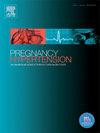与未用药妊娠相比,接受受体阻滞剂或钙通道阻滞剂治疗合并慢性高血压的妊娠期体重增加:来自PeriBank数据库的回顾性队列研究
IF 2.9
4区 医学
Q2 OBSTETRICS & GYNECOLOGY
Pregnancy Hypertension-An International Journal of Womens Cardiovascular Health
Pub Date : 2025-06-13
DOI:10.1016/j.preghy.2025.101228
引用次数: 0
摘要
这项回顾性队列研究评估了抗高血压药物与妊娠期体重增加(GWG)的关系。具体来说,我们比较了临床诊断为慢性高血压且接受β -肾上腺素能阻滞剂和钙通道阻滞剂治疗的孕妇GWG过高、预期和不足的频率。使用Python算法分析了受慢性高血压影响的妊娠的大型围产期数据库。排除有影响GWG危险因素的妊娠,以探索主要变量:钙通道阻滞剂和β -肾上腺素受体阻滞剂。对于每次怀孕,根据母亲的体重指数和分娩时的胎龄计算出推荐的妊娠体重增加量。对于每个队列(钙通道阻滞剂,β -肾上腺素受体阻滞剂,未用药),GWG的结果被认为是过度的,预期的,或不足基于推荐的妊娠体重增加。平均而言,未服用药物的孕妇比服用药物的孕妇体重增加更多。在两个服药队列中,GWG过高、预期和不足的频率相似。与未用药组相比,接受β -肾上腺素受体阻滞剂治疗的队列显示GWG不足的发生率更高。接受钙通道阻滞剂治疗的队列与未接受药物治疗的队列在三种GWG类别中均无显著差异。与未服药的孕妇相比,-肾上腺素受体阻滞剂与低出生体重有关,但与钙通道阻滞剂无关。钙通道阻滞剂和β -肾上腺素受体阻滞剂治疗与类似的GWG相关。尽管文献表明在体重控制方面的不同效果,但这表明这些类别的药物在GWG方面存在可互换的关系。本文章由计算机程序翻译,如有差异,请以英文原文为准。
Gestational weight gain in pregnancies complicated by chronic hypertension treated with beta-blockers or calcium channel blockers versus unmedicated pregnancies: A retrospective cohort study from the PeriBank database
This retrospective cohort study evaluated the association of antihypertensive medications with gestational weight gain (GWG). Specifically, we compared the frequency of excessive, expected, and insufficient GWG in pregnant people with a clinical diagnosis of chronic hypertension treated with beta-adrenergic blocking medications and calcium channel blockers.
A large perinatal database was parsed for pregnancies affected by chronic hypertension using a Python algorithm. Pregnancies with risk factors affecting GWG were excluded to explore the primary variables: calcium channel blockers and beta-adrenergic receptor blockers. For each pregnancy, the recommended amount of gestational weight gain was calculated based on maternal BMI and gestational age at delivery. For each cohort (calcium channel blockers, beta-adrenergic receptor blockers, unmedicated), the outcome of GWG was deemed excessive, expected, or insufficient based on recommended gestational weight gain.
Unmedicated pregnancies, on average, gained more weight than medicated pregnancies. The frequency of excessive, expected, and insufficient GWG across both medicated cohorts was similar. The cohort treated with beta-adrenergic receptor blockers showed a higher incidence of insufficient GWG compared to the unmedicated cohort. The cohort treated with calcium channel blockers did not differ significantly from the unmedicated cohort in any of the three GWG categories. Beta-adrenergic blockers were associated with lower birth weight when compared to unmedicated pregnancies, but not when compared to calcium channel blockers.
Treatment with calcium channel blockers and beta-adrenergic receptor blockers were associated with similar GWG. Despite literature suggesting contrasting effects on weight control, this suggests an interchangeable relationship between these classes of medication in terms of GWG.
求助全文
通过发布文献求助,成功后即可免费获取论文全文。
去求助
来源期刊

Pregnancy Hypertension-An International Journal of Womens Cardiovascular Health
OBSTETRICS & GYNECOLOGYPERIPHERAL VASCULAR-PERIPHERAL VASCULAR DISEASE
CiteScore
4.90
自引率
0.00%
发文量
127
期刊介绍:
Pregnancy Hypertension: An International Journal of Women''s Cardiovascular Health aims to stimulate research in the field of hypertension in pregnancy, disseminate the useful results of such research, and advance education in the field.
We publish articles pertaining to human and animal blood pressure during gestation, hypertension during gestation including physiology of circulatory control, pathophysiology, methodology, therapy or any other material relevant to the relationship between elevated blood pressure and pregnancy. The subtitle reflects the wider aspects of studying hypertension in pregnancy thus we also publish articles on in utero programming, nutrition, long term effects of hypertension in pregnancy on cardiovascular health and other research that helps our understanding of the etiology or consequences of hypertension in pregnancy. Case reports are not published unless of exceptional/outstanding importance to the field.
 求助内容:
求助内容: 应助结果提醒方式:
应助结果提醒方式:


